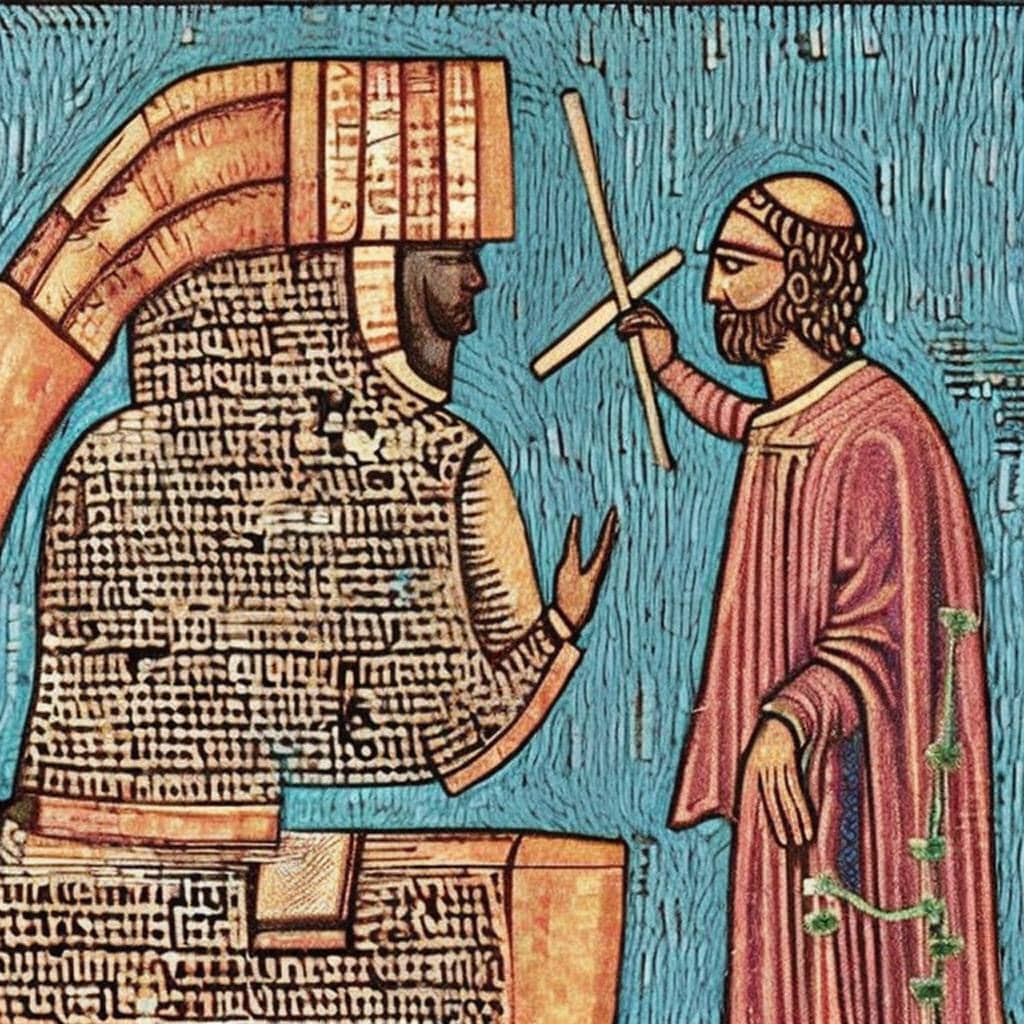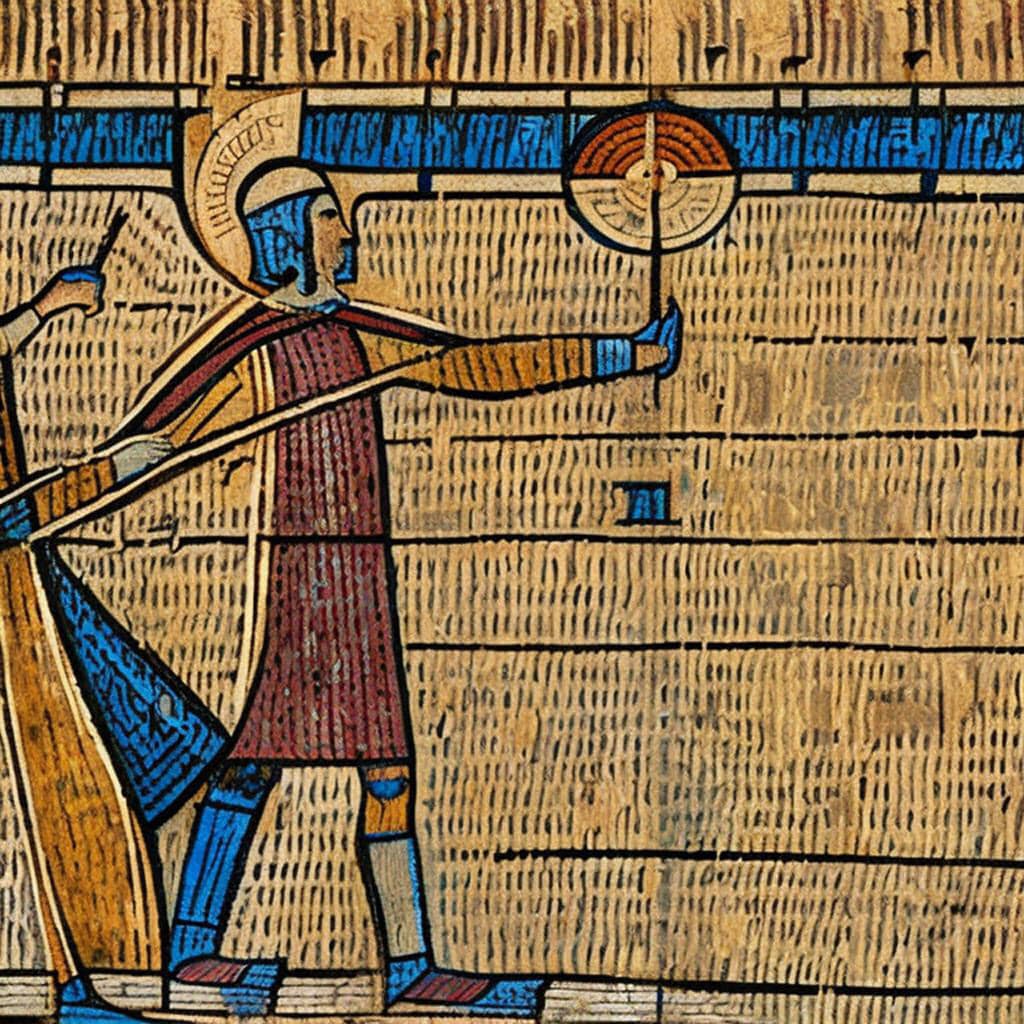AI and Biblical concordance
A biblical concordance is a tool that helps readers find and study specific words or concepts in the Bible. It provides a comprehensive index of all the words used in the Bible, along with their various occurrences and references. With a biblical concordance, readers can easily locate and study every instance of a particular word or phrase in the Bible, which can help them gain a deeper understanding of its meaning and significance.
The earliest biblical concordances date back to the medieval period, when scholars began compiling lists of biblical words and references in order to aid their study and research. However, it wasn’t until the invention of the printing press in the 15th century that biblical concordances became widely available to the general public. Today, there are numerous versions of biblical concordances available, ranging from print editions to digital versions that can be accessed on computers and mobile devices.
Biblical concordances are typically organized alphabetically, with each entry including a list of verses where the word appears, along with its original Hebrew or Greek meaning. They are particularly useful for scholars, theologians, and Bible students who want to explore the Bible’s rich vocabulary and examine how certain words are used throughout the text. By studying the various contexts in which a word appears, readers can gain insights into its meaning, as well as the broader themes and ideas that are woven throughout the Bible.
In addition to traditional print concordances, there are also digital concordances that offer a variety of advanced features. For example, some digital concordances allow users to search for words or phrases by specific criteria, such as by book, chapter, or verse. Others may include additional tools and resources, such as maps, timelines, and commentary from Bible scholars and theologians.
One of the most popular biblical concordances is Strong’s Concordance, which was first published in the late 19th century. Strong’s Concordance is organized according to the original Hebrew and Greek words used in the Bible, and includes an exhaustive list of verses where each word appears. It also includes a detailed dictionary that provides the original meaning of each word, along with its various translations in different English versions of the Bible.
Another popular biblical concordance is the Nave’s Topical Bible, which is organized according to specific topics and themes found in the Bible. This concordance includes over 20,000 entries, covering a wide range of topics such as love, faith, sin, salvation, and prayer. Each entry includes a list of relevant Bible verses, along with a brief summary of the topic or theme.
Other notable biblical concordances include the Exhaustive Concordance of the Bible, which includes over 400,000 references to biblical words and phrases, and the Young’s Analytical Concordance, which includes a comprehensive list of all the words used in the King James Version of the Bible.
A biblical concordance is an indispensable tool for anyone who wants to study and understand the Bible in depth. Whether you are a scholar, theologian, or simply a curious reader, a concordance can help you explore the rich vocabulary and themes found throughout the Bible, and gain new insights into its timeless message. With the advent of digital technology, biblical concordances are more accessible than ever before, making it easier for anyone to study and learn from this ancient and sacred text.
On the use of AI and biblical concordance
The use of artificial intelligence (AI) in biblical concordance has been gaining popularity in recent years. AI has the potential to revolutionize the way we study and understand the Bible, by offering advanced search capabilities, linguistic analysis, and other tools that can help us gain new insights into the text.
One of the ways that AI is being used in biblical concordance is through natural language processing (NLP) technology. NLP allows computers to understand and interpret human language, which is essential for building advanced search algorithms and linguistic analysis tools. By using NLP, AI-powered concordances can analyze the structure and meaning of Bible passages in order to identify patterns and connections that might not be apparent to human readers.
Another way that AI is being used in biblical concordance is through machine learning algorithms. Machine learning involves training computers to recognize patterns and make predictions based on large datasets. In the context of biblical concordance, machine learning can be used to identify trends and patterns in the use of specific words or phrases throughout the Bible. This can help scholars and theologians to gain new insights into the meaning and significance of certain passages, and to explore the deeper themes and ideas that are woven throughout the text.
AI-powered concordances can also offer advanced visualization tools that allow users to explore the Bible in new and innovative ways. For example, some concordances use interactive maps to show the geographic locations mentioned in the Bible, while others use timelines to help users understand the chronological order of events described in the text. These visualization tools can help readers to gain a deeper appreciation for the historical and cultural context of the Bible, and to understand how different events and themes are interconnected.
However, it is important to note that AI-powered concordances are not without their limitations. While AI can offer advanced search capabilities and linguistic analysis, it is still reliant on human interpretation of the text. Furthermore, AI-powered concordances may be biased towards certain interpretations or translations of the Bible, depending on the datasets and algorithms used in their development.
The use of AI in biblical concordance has the potential to transform the way we study and understand the Bible. By offering advanced search capabilities, linguistic analysis, and visualization tools, AI-powered concordances can help scholars and theologians to gain new insights into the text, and to explore the deeper themes and ideas that are woven throughout the Bible. However, it is important to approach these tools with a critical eye, and to recognize their limitations in terms of accuracy, bias, and human interpretation.
List of 50 verses in the Bible that mention “shepherd”
- Psalm 23:1 – “The Lord is my shepherd, I lack nothing.”
- John 10:11 – “I am the good shepherd. The good shepherd lays down his life for the sheep.”
- Isaiah 40:11 – “He tends his flock like a shepherd: He gathers the lambs in his arms and carries them close to his heart; he gently leads those that have young.”
- Ezekiel 34:12 – “As a shepherd looks after his scattered flock when he is with them, so will I look after my sheep. I will rescue them from all the places where they were scattered on a day of clouds and darkness.”
- Psalm 78:52 – “But he brought his people out like a flock; he led them like sheep through the wilderness.”
- Luke 15:4 – “Suppose one of you has a hundred sheep and loses one of them. Doesn’t he leave the ninety-nine in the open country and go after the lost sheep until he finds it?”
- Hebrews 13:20 – “Now may the God of peace, who through the blood of the eternal covenant brought back from the dead our Lord Jesus, that great Shepherd of the sheep.”
- Zechariah 13:7 – “Awake, sword, against my shepherd, against the man who is close to me!” declares the Lord Almighty. “Strike the shepherd, and the sheep will be scattered, and I will turn my hand against the little ones.”
- Matthew 26:31 – “Then Jesus told them, “This very night you will all fall away on account of me, for it is written: “‘I will strike the shepherd, and the sheep of the flock will be scattered.”
- 1 Peter 5:4 – “And when the Chief Shepherd appears, you will receive the crown of glory that will never fade away.”
- Psalm 80:1 – “Hear us, Shepherd of Israel, you who lead Joseph like a flock. You who sit enthroned between the cherubim, shine forth”
- Micah 5:4 – “He will stand and shepherd his flock in the strength of the Lord, in the majesty of the name of the Lord his God. And they will live securely, for then his greatness will reach to the ends of the earth.”
- Mark 6:34 – “When Jesus landed and saw a large crowd, he had compassion on them, because they were like sheep without a shepherd. So he began teaching them many things.”
- Psalm 79:13 – “Then we your people, the sheep of your pasture, will praise you forever; from generation to generation we will proclaim your praise.”
- Isaiah 53:6 – “We all, like sheep, have gone astray, each of us has turned to our own way; and the Lord has laid on him the iniquity of us all.”
- Jeremiah 23:4 – “I will place shepherds over them who will tend them, and they will no longer be afraid or terrified, nor will any be missing,” declares the Lord.”
- John 10:14 – “I am the good shepherd; I know my sheep and my sheep know me”
- Psalm 95:7 – “for he is our God and we are the people of his pasture, the flock under his care. Today, if only you would hear his voice,”
- Isaiah 44:28 – “who says of Cyrus, ‘He is my shepherd and will accomplish all that I please; he will say of Jerusalem, “Let it be rebuilt,” and of the temple, “Let its foundations be laid.”’”
- Psalm 28:9 – “Save your people and bless your inheritance; be their shepherd and carry them forever.”
- Genesis 49:24 – “But his bow remained steady, his strong arms stayed limber, because of the Shepherd, the Rock of Israel”
- Psalm 77:20 – “You led your people like a flock by the hand of Moses and Aaron.”
- Zechariah 11:17 – “Woe to the worthless shepherd, who deserts the flock! May the sword strike his arm and his right eye! May his arm be completely withered, his right eye totally blinded!”
- Jeremiah 3:15 – “Then I will give you shepherds after my own heart, who will lead you with knowledge and understanding.”
- Matthew 25:32-33 – “All the nations will be gathered before him, and he will separate the people one from another as a shepherd separates the sheep from the goats. He will put the sheep on his right and the goats on his left.”
- Psalm 28:3 – “Do not drag me away with the wicked, with those who do evil, who speak cordially with their neighbors but harbor malice in their hearts.”
- Isaiah 63:11 – “Then his people recalled the days of old, the days of Moses and his people— where is he who brought them through the sea, with the shepherd of his flock? Where is he who set his Holy Spirit among them,”
- Hebrews 13:20-21 – “Now may the God of peace, who through the blood of the eternal covenant brought back from the dead our Lord Jesus, that great Shepherd of the sheep, equip you with everything good for doing his will, and may he work in us what is pleasing to him, through Jesus Christ, to whom be glory for ever and ever. Amen.”
- Jeremiah 31:10 – “Hear the word of the Lord, you nations; proclaim it in distant coastlands: ‘He who scattered Israel will gather them and will watch over his flock like a shepherd.’”
- Matthew 26:56 – “But this has all taken place that the writings of the prophets might be fulfilled.” Then all the disciples deserted him and fled.”
- Psalm 100:3 – “Know that the Lord is God. It is he who made us, and we are his; we are his people, the sheep of his pasture.”
- Isaiah 61:5 – “Strangers will shepherd your flocks; foreigners will work your fields and vineyards.”
- Isaiah 40:10-11 – “See, the Sovereign Lord comes with power, and he rules with a mighty arm. See, his reward is with him, and his recompense accompanies him. He tends his flock like a shepherd: He gathers the lambs in his arms and carries them close to his heart; he gently leads those that have young.”
- Psalm 119:176 – “I have strayed like a lost sheep. Seek your servant, for I have not forgotten your commands.”
- Jeremiah 50:6 – “My people have been lost sheep; their shepherds have led them astray and caused them to roam on the mountains. They wandered over mountain and hill and forgot their own resting place.”
- John 21:16 – “Again Jesus said, “Simon son of John, do you love me?” He answered, “Yes, Lord, you know that I love you.” Jesus said, “Take care of my sheep.”
- Ezekiel 34:15 – “I myself will tend my sheep and have them lie down, declares the Sovereign Lord.”
- Psalm 74:1 – “Why have you rejected us forever, O God? Why does your anger smolder against the sheep of your pasture?”
- Luke 12:32 – “Do not be afraid, little flock, for your Father has been pleased to give you the kingdom.”
- Jeremiah 31:6 – “There will be a day when watchmen cry out on the hills of Ephraim, ‘Come, let us go up to Zion, to the Lord our God.’”
- Isaiah 53:7 – “He was oppressed and afflicted, yet he did not open his mouth; he was led like a lamb to the slaughter, and as a sheep before its shearers is silent, so he did not open his mouth.”
- Zechariah 10:2 – “The idols speak deceitfully, diviners see visions that lie; they tell dreams that are false, they give comfort in vain. Therefore the people wander like sheep oppressed for lack of a shepherd.”
- Jeremiah 50:17 – “Israel is a scattered flock that lions have chased away. The first to devour them was the king of Assyria; the last to crush their bones was Nebuchadnezzar king of Babylon.”
- Matthew 9:36 – “When he saw the crowds, he had compassion on them, because they were harassed and helpless, like sheep without a shepherd.”
- Ezekiel 34:23 – “I will place over them one shepherd, my servant David, and he will tend them; he will tend them and be their shepherd.”
- Zechariah 11:4-5 – “This is what the Lord my God says: “Shepherd the flock marked for slaughter. Their buyers slaughter them and go unpunished. Those who sell them say, ‘Praise the Lord, I am rich!’ Their own shepherds do not spare them.”
- Matthew 26:52-54 – ““Put your sword back in its place,” Jesus said to him, “for all who draw the sword will die by the sword. Do you think I cannot call on my Father, and he will at once put at my disposal more than twelve legions of angels? But how then would the Scriptures be fulfilled that say it must happen in this way?””
- Isaiah 44:1-2 – ““But now listen, Jacob, my servant, Israel, whom I have chosen. This is what the Lord says— he who made you, who formed you in the womb, and who will help you: Do not be afraid, Jacob, my servant, Jeshurun, whom I have chosen.”
- Ezekiel 37:24 – “‘My servant David will be king over them, and they will all have one shepherd. They will follow my laws and be careful to keep my decrees.”
- Psalm 79:1 – “O God, the nations have invaded your inheritance; they have defiled your holy temple, they have reduced Jerusalem to rubble.”
Table summarizing some of the characteristics of the shepherd, sheep, and flock mentioned in the Bible
| Characteristic | Shepherd | Sheep | Flock |
| Leadership | Leads and guides the sheep | Follows the shepherd | Follows the leader |
| Protection | Protects the sheep from danger | Dependent on the shepherd for protection | Protected by the shepherd |
| Provision | Provides food, water, and shelter for the sheep | Dependent on the shepherd for provision | Provided for by the shepherd |
| Care | Takes care of the individual needs of each sheep | Needs care from the shepherd | Cared for as a group |
| Ownership | Owns and cares for the sheep | Belongs to the shepherd | Belongs to the shepherd |
| Unity | Keeps the flock together and united | Follows the flock | United as a group |
| Vulnerability | Can be vulnerable and at risk without the shepherd’s care | Vulnerable and in need of protection | Vulnerable as a group |
| Obedience | Obeys the shepherd’s commands | Responds to the shepherd’s voice | Obeys the leader |
| Relationship | Has a close relationship with the sheep | Has a close relationship with the shepherd | Has a close relationship with one another |
| Redemption | Seeks out and saves lost sheep | Can be lost and in need of redemption | Can be redeemed as a group |
Note: These characteristics are not exhaustive and may vary depending on the specific passage in the Bible.
A text that summarizes the biblical concepts of the flock, shepherd, and sheep
The Bible often uses the metaphor of a flock of sheep to describe the relationship between God and his people. The shepherd is responsible for leading, protecting, and caring for the sheep, while the sheep are dependent on the shepherd for guidance, provision, and safety.
The flock is a community of believers who come together under the leadership of a shepherd. They are united by a common faith and a shared purpose, and they are vulnerable without the protection and care of their shepherd. The flock is also called to obedience, following the commands of their shepherd and responding to his voice.
The shepherd is a figure of authority who is called to lead the flock with wisdom and compassion. He is responsible for protecting the flock from danger and providing for their needs, including food, water, and shelter. He also seeks out lost sheep and redeems them, bringing them back into the fold.
The sheep are the members of the flock who follow the shepherd’s lead. They are vulnerable and in need of protection, but they also have a close relationship with their shepherd. They respond to his voice and obey his commands, trusting that he will guide them safely through the dangers of the world.
The Bible teaches that Jesus is the Good Shepherd who lays down his life for the sheep. He is the ultimate leader and protector of the flock, offering redemption and salvation to all who believe in him. As his followers, we are called to trust in his guidance and to follow his example of selfless love and care for others.
The biblical concepts of the flock, shepherd, and sheep emphasize the importance of community, leadership, and trust. The shepherd is responsible for leading and protecting the flock, while the sheep are called to follow his lead and obey his commands. Through this relationship, we are reminded of God's love and care for us, and we are encouraged to live lives of obedience and service to him.

A short text that summarizes the biblical concepts of the flock, shepherd, and sheep using allegory
The Lord is our shepherd, and we are His sheep. He guides us and protects us, leading us to green pastures and still waters. We are part of His flock, a community of believers who follow His lead and obey His commands. As sheep, we are vulnerable and in need of His care, but we also have a close relationship with our shepherd, responding to His voice and trusting in His guidance. Through His love and care, we are redeemed and brought back into His fold. Let us follow His with faith and obedience, for His is the Good Shepherd who lays down His life for his sheep.
Relation between sheeps and flock
In the Bible, sheep are often used as a metaphor for the members of a flock. Just as sheep follow the lead of their shepherd, members of a flock are called to follow the guidance of their spiritual leaders. The flock is a community of believers who come together under the leadership of a shepherd, united by a shared faith and a common purpose. Like sheep, members of a flock are vulnerable and in need of protection, but they also have a close relationship with their shepherd and with one another. The Bible teaches that the shepherd is responsible for leading, protecting, and caring for the flock, just as the Good Shepherd, Jesus Christ, is responsible for leading and caring for His followers. As members of a flock, we are called to obey the commands of our shepherd and to support one another in our shared journey of faith.
A rewriting of Psalm 23, which emphasizes the themes of the shepherd, sheep, and flock
The Lord is my shepherd; I shall not want.
He leads me beside still waters and into green pastures.
He protects me from harm and watches over me day and night.
I am one of his sheep, a member of his flock.
I follow his lead and respond to his voice, for He is my shepherd and my guide.
Even though I may walk through the valley of the shadow of death,
I fear no evil, for He is with me.
He comforts me and lifts me up, renewing my spirit.
He prepares a table before me in the presence of my enemies,
Anointing my head with oil and pouring out His blessings upon me.
Surely goodness and mercy shall follow me all the days of my life,
And I shall dwell in the house of the Lord forever, as part of his beloved flock.
The original Psalm 23
“The Lord is my shepherd; I shall not want.
He maketh me to lie down in green pastures:
He leadeth me beside the still waters.
He restoreth my soul:
He leadeth me in the paths of righteousness for his name’s sake.
Yea, though I walk through the valley of the shadow of death,
I will fear no evil: for Thou art with me;
Thy rod and Thy staff they comfort me.
Thou preparest a table before me in the presence of mine enemies:
Thou anointest my head with oil;
my cup runneth over.
Surely goodness and mercy shall follow me all the days of my life:
and I will dwell in the house of the Lord for ever.”

Source OpenAI’s GPT language models, Fleeky, MIB, & Picsart
Thank you for questions, shares and comments!
Share your thoughts or questions in the comments below!






